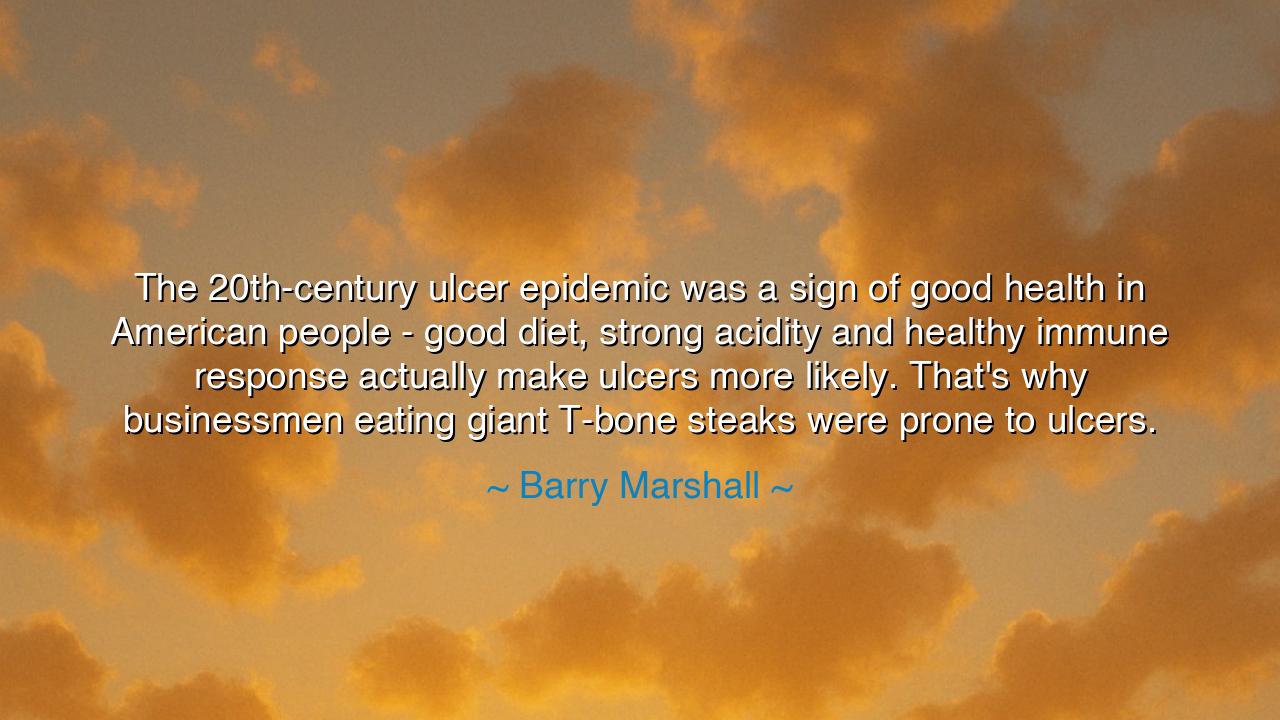
The 20th-century ulcer epidemic was a sign of good health in
The 20th-century ulcer epidemic was a sign of good health in American people - good diet, strong acidity and healthy immune response actually make ulcers more likely. That's why businessmen eating giant T-bone steaks were prone to ulcers.






In the ever-changing dance of health and well-being, there lies a profound and paradoxical truth, one that Barry Marshall reveals with clarity: "The 20th-century ulcer epidemic was a sign of good health in American people - good diet, strong acidity, and healthy immune response actually make ulcers more likely. That's why businessmen eating giant T-bone steaks were prone to ulcers." At first glance, this might seem like a contradiction—a people consumed by disease being told their health may have contributed to it. But in these words, Marshall points to an ancient understanding: health is not always a straightforward path, and the forces that drive it are often more complex than they appear.
In the ancient world, the great philosophers and healers, from Hippocrates to Galen, understood that the body was a complex system where balance was key. Hippocrates, the father of medicine, often spoke of the delicate balance between humor (bodily fluids) and how it affected health. He understood that acidity, in moderation, played a role in digesting food and maintaining vitality, but too much, or too little, could lead to illness. Like Marshall's insights on ulcers, ancient healers knew that the body's natural processes—like digestion and immune response—were inherently tied to health and that excess in one area could lead to imbalance elsewhere. Marshall's observation about the ulcer epidemic echoes this ancient wisdom, reminding us that health is a complex dance between factors, and what seems good can sometimes lead to unintended consequences.
Consider the story of Alexander the Great, whose legendary conquests were fueled by not just ambition, but by the strength of his body and his spirit. Yet, the very strength that allowed him to conquer the world also led to his downfall. His diet was rich in meats and wine, and his physical endurance was constantly tested in battle. In the end, Alexander died young—some say of a fever, others suggest the stress of his immunological response and a weakened system due to his indulgent lifestyle. In this, we see the paradox at play: the health and strength of his body, fueled by his diet and physical prowess, may have also contributed to his early death. Marshall’s words on the ulcer epidemic remind us that strength and health are not always synonymous, and that the very things we believe make us stronger may, in some ways, hasten our downfall.
The Romans, too, were familiar with the tension between strength and excess. In their time, indulgence in food was common among the upper classes, and the rich feasts of Rome were legendary. But the philosopher Seneca warned against the consequences of overindulgence. In his letters, he spoke of moderation and the dangers of gluttony, understanding that health required a balance between nourishment and restraint. Like the businessmen of America who devoured T-bone steaks, the wealthy Romans were prone to the illnesses that came with their indulgences. Seneca understood that the body’s strength could be both a blessing and a curse, especially when it was pushed to its limits by excess.
In the modern era, Marshall's findings about the ulcer epidemic challenge our understanding of what constitutes health. The ulcer, often associated with stress and diet, is in itself a symbol of the human condition: we seek strength and vitality, yet often achieve it through means that push our bodies beyond their natural limits. Marshall reminds us that acidity, strong immune responses, and dietary indulgences, when taken too far, can have unintended consequences. The same strength that made the American businessmen successful—eating hearty meals, meeting challenges head-on—was also the very force that made them more likely to suffer from ulcers. The paradox is clear: excess strength, if not tempered by wisdom, can lead to suffering.
The lesson here, then, is one of balance. Just as the ancients understood the importance of moderation in all things, Marshall’s insight teaches us that health is not simply about what we eat or how strong we are—it is about finding the right equilibrium. A life lived with balance—where diet, stress, and the immune system are in harmony—creates the conditions for true vitality. We are reminded that the very things we think make us strong, such as an excess of food or work, may be the very things that lead to our downfall.
Let us take this lesson to heart. In our own lives, we must not fall into the trap of excess—whether in our work, our diet, or our ambitions. Like the ancient philosophers, we must strive for moderation, understanding that the path to true strength is not through indulgence but through balance and wisdom. Whether in our diet or in our daily lives, we must be mindful of the forces we wield—knowing that even the strongest immune responses or the most hearty meals can, if left unchecked, lead to imbalance and illness. By embracing balance, we ensure that our strength serves us, rather than overwhelms us.






AAdministratorAdministrator
Welcome, honored guests. Please leave a comment, we will respond soon